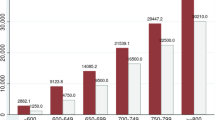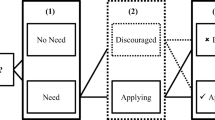Abstract
Advancements in technology are changing the traditional way of financial transactions. The cash oriented society is transformed into a “plastic money” society. During the last few years, credit card usage has expanded rapidly worldwide. Customers use their cards for a number of reasons such as paying regular bills, emergencies, spontaneous spending etc. The credit cards industry is in the growth stage of its product life cycle and it is a profitable business for banks. In this paper, based on a data sample from a large Greek bank, we identify factors that are important for a bank’s management in order to approve or reject an application for a credit card, while at the same time attempting to retain the institution’s clientele. We model multivariate categorical data using the logistic regression model. To motivate our choice model we assume that the approval of an application depends on a number of explanatory variables, and our principle objective is to understand the potential factors that contribute in the final decision and to identify the important covariates in predicting the binary outputs.
Similar content being viewed by others
References
Agresti, A. (1990).Categorical Data Analysis. First Edition, John Wiley & Sons, Inc.
Ausubel, L. (1991) “The Failure of Competition in the Credit Card Market”The American Economic Review 81 (1), 50–81
Collett, D. (1991),Modelling Binary Data. First Edition, Chapman & Hall
Dobson, A. (2002),An Introduction to Generalized Linear Models. Second Edition, Chapman & Hall
Feller, W. (1968),An Introduction to Probability Theory and its Applications. Third Edition, Willey, New York.
Gujarati, D. (2003),Basic Econometrics. Forth Edition, McGraw-Hill International Editions.
Lucas, A. (2001), “Statistical challenges in credit card issuing”Applied Stohastic models in business and industry 17, 83–92
Neider, J., P. McCullagh ‘Generalized Linear Models’ Second Edition, Chapman & Hall
Nash, R., J. Sinkey (1997), ‘On competition, Risk and Hidden Assets in the Market for Bank Credit Cards’Journal of Banking and Finance 21, 89–112.
Park, S. (1998) “Non-traditional activities and the efficiency of US commercial banks”Journal of Banking and Finance,22(4), 487–462
Snell, D., R.Cox (1989) “Analysis of Binary Data’ Second Edition, Chapman & Hall
Zopounidis, C., M. Doumpos (2002), “Multi-group discrimination using multi-criteria analysis: Illustrations from the field of finance.European Journal Of Operational Research 139 (2), 371–389
Author information
Authors and Affiliations
Rights and permissions
About this article
Cite this article
Mavri, M., Ioannou, G. An empirical study for credit card approvals in the Greek banking sector. Oper Res Int J 4, 29–44 (2004). https://doi.org/10.1007/BF02941094
Issue Date:
DOI: https://doi.org/10.1007/BF02941094




